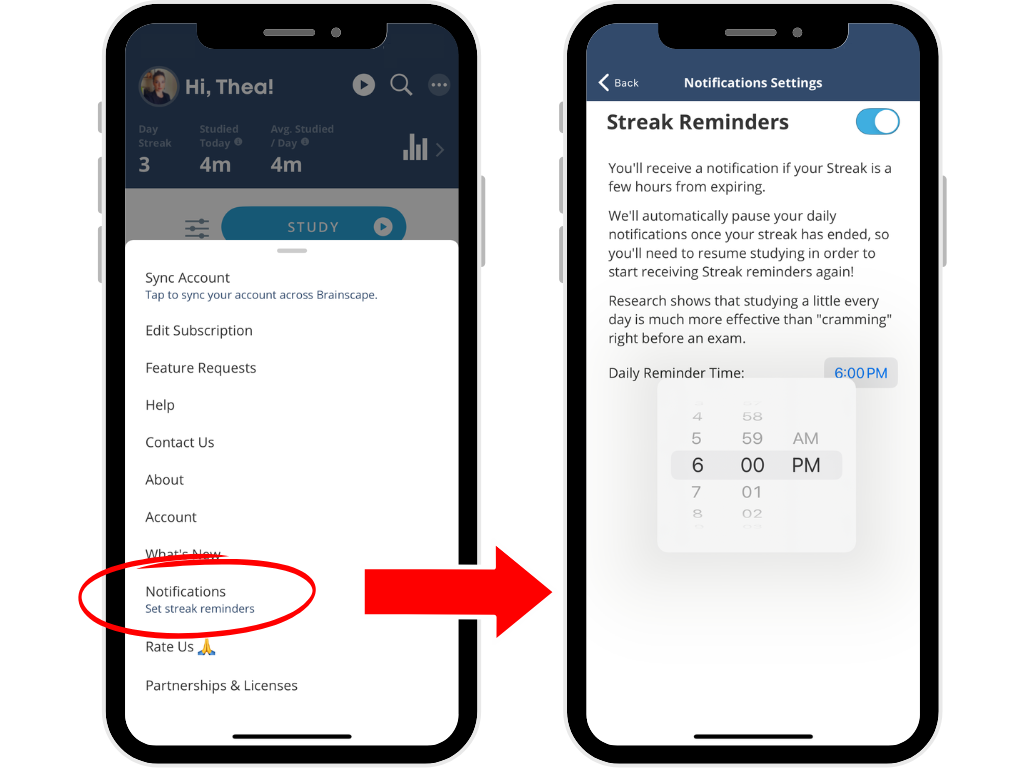You may love studying your field, but memorizing a stack of lecture notes so that you can pass your exams is another story entirely. Especially since there are so many distracting, exciting, and colorful things in the … oh look, a butterfly!
Even top-performing students with ninja-level self-discipline struggle with focus. The difference, however, is that they have developed the right study habits that not only get them in their chairs to study but keep them there, too.
What’s their secret? How can you better concentrate while studying?
You, my friend, are holding the (virtual) answer in your hands. In this article, we're going to show you:
- How to focus from the start
- How to maintain focus and overcome daydreaming
- How to become a more focused person overall
How to Focus While Studying from the Start
Almost all of the problems associated with an inability to focus while studying fall into one of two broad categories:
- Issues of inertia: Difficulty starting to study
- Issues of daydreaming: Difficulty maintaining concentration when studying
Both have the same frustrating results but require different solutions. You need to do is calm your thoughts and minimize distractions just like you do when falling asleep, only now you're going to unleash 100% of your cognitive powers on learning and remembering!
Here’s how to do that ...
Tip # 1 for Focusing While Studying: Set Up a Peaceful, Distraction-Free "Study Bubble"
- Set out all your materials, stationery, caffeine pills … whatever you need to learn. You shouldn’t have to get up for anything once you’ve started.
- Have a word with your family, partner, housemates, cat, parrot, needy indoor plants … whoever could distract you. Explain politely that it’s study time and that you’d appreciate some quiet with minimal interruptions.
- Clear out your inbox. If there are emails that require time-consuming action, write them down on a to-do list so that you won’t forget to take care of it later. The science is clear: Multi-tasking does not work!
- Clear your phone of notifications and then leave it in another room.
- Optimize your body and brain to study. Go to the toilet, fill up your water bottle, brew a cup of coffee or tea, set out your snacks, and get a good night’s rest the night before. Internal distractions are just as important in putting your mind at ease.
- Knock out any important, potentially distracting tasks before your allotted study time—like paying a bill, feeding the cat, or breaking up with your annoying boyfriend.
Now, you don’t have to do all of the above to prepare your study bubble, but if you’re easily distracted and have a tendency to procrastinate when studying, clearing your plate can go a long way in helping you focus better.
Tip # 2 for Focusing While Studying: Set Goals and Milestones
The key to mastery is consistently devoting time to learning, whether it’s ten minutes or two hours a day. Therefore, your next step towards honing razor-sharp skills of focus is to set study goals or milestones.
Here are three steps to doing that:
- Skim the material before diving in.
- Identify your strengths and weaknesses.
- Break everything down into "bite-sized" study sessions.
Now, you can break your huge task down into manageable daily chunks, depending on the amount of time you can spare each day to study. (You can use Brainscape's free study schedules and exam planners!)
How does all of this preparation help you to focus on studying from the start?
- Memory refresh: Scanning through your study notes in order to establish a study plan refreshes your memory and helps to connect the dots on everything you’ve learned during the course or semester.
- Perspective: By establishing that zoomed-out view of what needs to be done, you’ll probably feel a lot less intimidated by the task at hand.
- Motivation: With the study material broken down into smaller, more achievable milestones, you get that delicious “reward-like” sensation far more frequently. Mmm … dopamine. (Also, keeping a finger on the pulse of your study metrics can be a huge motivation because it allows you to visualize your progress toward your goals.)
- Momentum: Because this exercise isn’t memory-intensive or even focus-intensive, it makes it easier to start. Once you’ve overcome that study inertia, the momentum can kick in.
Essentially, you have just created the perfect conditions to start studying. Good job! Now, let's look at how you can stay focused to keep studying.
How to Maintain Focus While Studying

If it’s not external distractions (the cat, a noisy housemate, or notifications plucking at your concentration), it’s internal distractions: the little siren’s song of the voice seducing you away from your books. Either way, staying focused while studying is hard. How can you overcome that particularly saucy daydream about Nigella Lawson or Ryan Gosling (or both)?
Tip # 3 for Staying Focused While Studying: Set Goals that Are Appropriate to Your Mental Gear
On some days, it feels like we can cruise through our study material like a Mercedes SLR McLaren 722 on an eight-lane autobahn. On other days, it's like we’re rattling down a potholed country road in an ancient pickup truck.
The trick is to recognize which gear your brain is in and shift your study approach to suit it.
If you're in a high mental gear, plan a long study session and try attacking the areas you’ve been having difficulty in. However, if you’re feeling flakey, hungover, or easily distracted, shift down and instead plan a series of short 5 to 10-minute flashcard sessions with frequent study breaks in between and some kind of reward at the end. You'll probably end up studying longer than that if you're on a roll.
The point is to capitalize on the energy you do have and still manage to study productively on the days you find your energy waning. Remember, the most productive people are skilled at managing their energy and attention, and not just their time.
Tip # 4 for Staying Focused While Studying: Vary Your Learning Methods
Everyone burns out eventually. There’s only so much work you can do before your mind wanders. To kickstart your concentration, try a bit of variety, both in your study environment and method:
- Try a change of scenery: Go for a walk or relocate to your local library, coffee shop, or even just a different room in your home.
- Do just one round of flashcards: Take a break from your books and try a different study medium altogether, such as studying flashcards in Brainscape!
- Arrange a study session with a group of peers: This functions as a nice adjunctive method to your regular studying because (1) it holds you accountable, (2) your peers can help you address your weaknesses, and (3) in helping them, you're able to review your knowledge.
Tip # 5 for Maintaining Study Focus: Set Automated Study Reminders
Take the guesswork and decision-making out of studying by programming study notifications into your device. You can easily do this with Brainscape, which has study streak reminders: gentle “nags” to keep your daily study streak alive.

To activate it, simply go into the menu in the mobile app (left), select Notifications, and then you can then toggle on Streak Reminders (right). Those will show up as notifications on your phone’s home screen, reminding you to stop what you’re doing and put in a quick study round with Brainscape. You can also customize the time of day you’d prefer to receive your reminders!
Tip # 6: Use the Right Tools to Stay Focused While Studying!
One effective study tool that rolls all of the aforementioned hacks into one ridiculously good-looking flashcard-based learning platform is Brainscape, which breaks down content-heavy subjects into collections of bite-sized flashcards. These are then delivered to you via the hyper-efficient learning power of spaced repetition, metacognition, and active recall to help you learn twice as fast as any other study technique.
In short, Brainscape is engineered to:
- Make starting studying as easy as tapping a single button, eliminating mental inertia.
- Make learning incredibly accessible wherever you go, even offline.
- Deliver the content to your brain in a way that is optimized for retention so you get more done in less time.
- Create a fun, engaging, and gamified study experience with tons of learning stats and awards to chase.
- Provide you with detailed study metrics so you can keep a finger on the pulse of your progress.
If you struggle with starting to study and continuing to study, Brainscape is a powerful study tool that'll get you through any test or exam prep.
FAQ: How to Focus While Studying
How can I improve my focus while studying?
Improving focus starts with understanding your own habits. Begin by minimizing distractions, both digital and physical. Then experiment with tools that help build structure, like timers, study apps, or daily checklists. Just like muscles, your attention span strengthens with consistent training and the right environment.
How do you get 100% concentration and focus?
Total focus isn’t about forcing intensity. It’s about creating flow. That means studying tasks that match your energy level, setting clear mini-goals, and eliminating interruptions. Working in focused sprints with short breaks can also keep your brain sharp and engaged.
Why can't I focus when studying?
There could be multiple reasons: mental fatigue, a distracting environment, lack of sleep, unclear goals, or even anxiety about the task itself. Often, the root cause is overwhelm: too much information and no clear starting point. Try simplifying your study session into a smaller first step to kickstart momentum.
How to stay focused while studying with ADHD?
If you have ADHD, it's especially helpful to work in short, structured bursts. Use visual timers, break study goals into micro-tasks, and rotate between study methods to keep your brain stimulated. Tools that offer progress tracking or gamified rewards, like Brainscape's study streaks, can also boost motivation and focus.
How to Become More Focused on Studying
Studying is a demanding mental activity, so it’s no wonder that it tends to inspire inertia. But after reading all this (good job!), you should have a comprehensively stocked mental toolkit at your disposal. Now you know how to improve concentration, start studying, and keep studying. It's even easier with Brainscape, an app that organizes everything you need to learn so that you can start studying with one click.
You have everything you need to smash that exam into the bleachers right there in your he—SQUIRREL!

References
Cleveland Clinic. (2024, June 27). Why multitasking doesn’t work. https://health.clevelandclinic.org/science-clear-multitasking-doesnt-work
Cohen, A. (2015, November 25). 3 reasons why snacks are superior to social media for distracting yourself. Entrepreneur. https://www.entrepreneur.com/science-technology/3-reasons-why-snacks-are-superior-to-social-media-for/253124
McCormick, H. (2024, April 22). How to Gamify your Productivity – Center for Entrepreneurship. Center for Entrepreneurship. https://cfe.umich.edu/how-to-gamify-your-productivity/
Namba, R. (2024, April 18). The Pomodoro technique: study more efficiently, take more breaks - Learning Commons. Learning Commons. https://learningcommons.ubc.ca/the-pomodoro-technique-study-more-efficiently-take-more-breaks/
Oliveira, A., Spinola, V., Garrido, D., Teixeira, M. M., Salles, C., & Haddad, A. E. (2023). Influence of learning styles on student performance in self-instructional courses. PloS One, 18(7), e0289036. https://doi.org/10.1371/journal.pone.0289036
Sörqvist, P., & Marsh, J. E. (2015). How concentration shields against distraction. Current Directions in Psychological Science, 24(4), 267–272. https://doi.org/10.1177/0963721415577356
Sutton, J., PhD. (2024, May 23). Victor Vroom’s Expectancy Theory of Motivation. PositivePsychology.com. https://positivepsychology.com/expectancy-theory/
UNC-Chapel Hill Learning Center. (2024, February 19). Distractions – Learning Center. Learning Center. https://learningcenter.unc.edu/tips-and-tools/take-charge-of-distractions/
